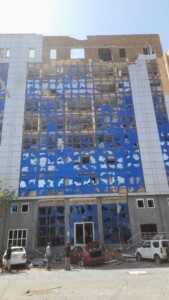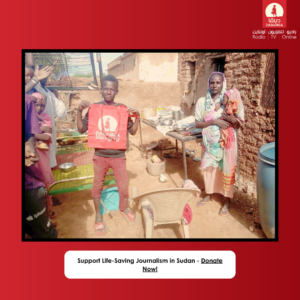NISS confiscates Sudan daily again
The Sudanese security service has seized copies of Akhir Lahza newspaper for the second time within 72 hours without providing any reasons for the decision.
The Sudanese security service has seized copies of Akhir Lahza newspaper for the second time within 72 hours without providing any reasons for the decision.
Two agents of Sudan's National Intelligence and Security Service (NISS) came to the printing house in Khartoum at 1 am on Sunday and confiscated all the printed copies of daily Akhir Lahza. On Friday, the print run of Akhir Lahza was seized too.
the Sudanese Journalists Association for Human Rights (JAHR) issued a statement about the confiscation the same day. It described the confiscation of the print runs as a “punitive and disciplinary security measure” against the newspapers for publishing unwanted reports.
“It is aimed at inflicting political, economic and moral losses on the newspapers and to force them to exercise self-censorship.”
Since last week, the NISS has intensified its crackdown on the newspapers. The security service confiscated copies of El Sayha newspaper on 17 and 18 April after they were printed.
The entire issues of El Taghyeer were seized on 12 and 13 April, after security agents interrogated the editor-in-chief.
In addition, the issues of El Ayaam and another newspaper called El Mustagilla were seized on 27 March, Reporters Without Borders (RSF) said on 18 April.
The NISS did not provide its reasons for any of the confiscations, however, nearly all newspapers had just published articles that were critical of the functioning of President Omar Al Bashir or the Sudanese government.
The press freedom organisation is concerned about the repeated seizures. RSF found that Sudan has not improved its press freedom and treatment of journalists, and ranked it 174 out of the 180 rated countries in last week's World Press Freedom Index. Sudan's position is the same as in last year's index.
'Red lines'
Last year, the NISS changed its approach against the press with its broad powers of arrest and detention, search and seizure, under the National Security Act of 2010. It increased the number of ‘red lines’ on particular topics from 25 to 38 topics that the press is not permitted to cross, such as views that disagree with the government’s position on various issues, and restored the possibility to censor newspapers before publication.
In an interview with a Sudanese newspaper last December, NISS director Mohamed Atta El Moula said that the measures taken against the Sudanese press are not “arbitrary” but based upon the law. Therefore, he noted, they are forced to take those measures.
“The National Intelligence and Security Service (NISS) hounds journalists and censors the print media, above all by closing down newspapers, such as the daily El Tayar in December 2015,” the Press Freedom Index of RSF read, “Or by confiscating entire newspaper issues as they come off the press.”











 and then
and then